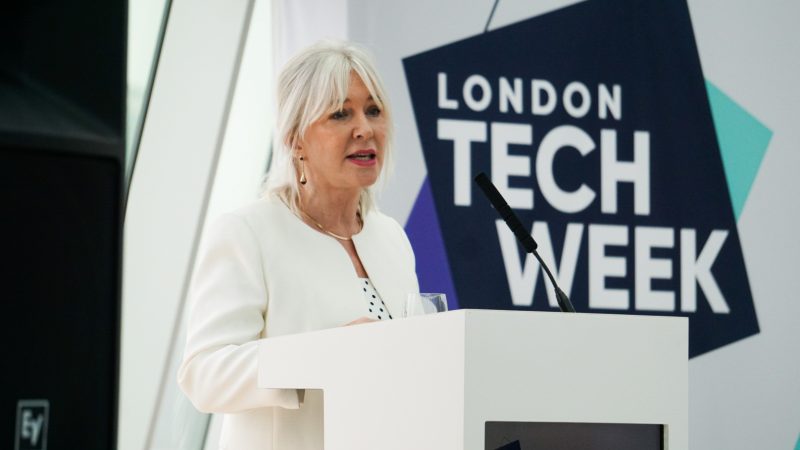Nadine Dorries announced the return of the Online Safety Bill, but even Conservatives worry that it will chill free speech online.

Culture Secretary Nadine Dorries has announced that the government’s revised Online Safety Bill will return to the House of Commons this Thursday.
The Conservative Government has been saying it wants to bring further regulations for online platforms and content for a number of years, but since first proposing to bring in age verification checks for people accessing pornography in the UK in the 2017 Digital Economy Act, implementation has stalled. Age verification has now been revived, and is one of a number of measures in the new Online Safety Bill.
The Bill also includes measures to make ‘online flashing’ a crime, and clamp down on online scams and fraud. The Bill will place obligations on search engines, social media platforms and influencers to ensure compliance with the new provisions. The Government has even paid for a featured advertorial in the New Statesman to promote the Bill.
Dorries also says that the bill will help ensure freedom of speech online. How? “Right now, there is no official right to appeal when a post is taken down. Under this Bill, there will be.” There will also be “extra protections for journalists online”. There will also be “important democratic content – for example, when a person wants to tweet their thoughts about an MP or a political party during a general election”.
Journalists will apparently have an “expedited right to appeal if their content is removed”, though this leaves open the issue of who gets to be identified as a journalist and who does not.
Free speech advocates, as well as Conservatives like David Davis are also concerned about the Bill’s attitude towards ‘legal but harmful’ content which could be suppressed. Dorries is seeking to reassure people with these concerns, saying that:
“Companies will only be required to remove “legal but harmful” content if it is already banned in their own terms and conditions. This only applies to the biggest platforms carrying the highest risk, and we are updating the legislation to ensure platforms focus on priority categories of harm that are set out in secondary legislation.”
But the legislation didn’t seem to go down very well with readers of Conservative Home, who believe it is a threat to freedom of speech. It seems that the Tories are having problems balancing their need to please cultural conservatives worried about pornography and other harmful content and free speech libertarians who worry about government overreach.
As campaign group Open Rights Group (ORG) have pointed out, large online platforms currently automate their content moderation, as they cannot have real people looking at every post: “The algorithmic moderation deployed by most social media companies is notoriously literal, and the human review of content is often performed by people who are unaware of the context in which messages are sent.”
These algorithms or low paid human reviewers have to make decisions about what constitutes illegal content, and with the new legislation increasing penalties for illegal and harmful content, ORG argues that “those platforms will become more cautious… and so will their moderation systems. There will be more ‘false positives’ and more perfectly legal content will be removed. This will be a significant and ongoing violation of everyone’s right to freedom of expression.”
ORG also say the new law will give Nadine Dorries new powers to decide what exactly ‘harmful content’ means. This vagueness, with details like Codes of Practice to be contained in secondary legislation, means that it’s hard to judge the legislation at the moment and gives Dorries wide scope to tweak the law further down the line. In January, the Digital, Culture, Media and Sport (DCMS) Committee released a report expressing concern about the Bill’s threat to freedom of expression.
Paul Bernal, Professor of IT Law at UEA, said he thought the legislation would have little effect. Bernal says that the legislation “misdiagnoses the problems and overestimates the capability of technical solutions. It’s a classic set of magic wand wishful thinking.”
Iain Corby, Executive Director of the Age Verification Providers Association, expressed doubts about what the final Bill would contain when published on Thursday. He told LFF that “there appears to have been a shift in policy to narrow the requirement to protect children from legal but harmful content to just the largest platforms.”
The AVPA is a trade body that represents companies that could provide technology to make sure users of a website are old enough to access adult content. Corby also said that “the process for agreeing a schedule of harms involves Ofcom, the Secretary of State and Parliament and could easily take another year after Royal Assent of the Bill itself.”
Corby also expressed doubt about enforcement powers which “currently require individual court orders against each website – there are over a million porn sites and hundreds more created each day. The powers themselves to block access, payments and other supporting services such as hosting are effective, but Ofcom needs to be able to apply them at vast scale.”
As a result, “the new Bill may create further opportunities to kick this can down the road, certainly until beyond the next election.” Professor Paul Bernal also told LFF that he doubted the Bill would be effective because of the impracticality of Ofcom applying the rules at scale, saying “people will soon realise Ofcom isn’t up to the job.”
As usual, it seems that the government’s rhetoric is unable to live up to the reality of what they are able to implement.
John Lubbock leads on the Right-Watch project at Left Foot Forward
To reach hundreds of thousands of new readers we need to grow our donor base substantially.
That's why in 2024, we are seeking to generate 150 additional regular donors to support Left Foot Forward's work.
We still need another 117 people to donate to hit the target. You can help. Donate today.



